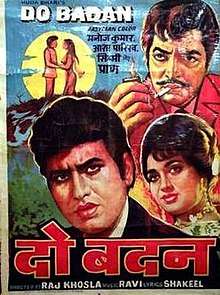Do Badan
Do Badan (English: Two Bodies) is a 1966 Hindi film directed by Raj Khosla, and starring Manoj Kumar, Asha Parekh, Simi Garewal and Pran. The music is by Ravi.[1] The film became a big hit at the box office.[2]
| @ Do Badan | |
|---|---|
 | |
| Directed by | Raj Khosla |
| Produced by | Huda Bihari |
| Screenplay by | G.R. Kamat Virendra Sinha (dialogue) Chandrakant (additional dialogue) |
| Story by | M. Mashhadi |
| Starring | Manoj Kumar Asha Parekh Simi Garewal Pran |
| Music by | Ravi |
| Cinematography | V.N. Reddy |
| Edited by | Govind Dalwadi D.N. Pai |
Release date |
|
| Country | India |
| Language | Hindi |
The film idea was suggested by Manoj Kumar, who asked Khosla to accompany him for a show of Deedar (1951), directed by Nitin Bose, which was having a rerun in local theatres. Thereafter, the story of Do Badan was written after reworking its story line and the screenplay was written by G.R. Kamat.[3]
Plot
Vikas (Manoj Kumar) comes from a poor family, and is attending college so that he can complete his studies, get a job, and look after himself and his dad. He meets with wealthy Asha (Asha Parekh) at this college, and after a few misunderstandings, both fall in love. Vikas' dad passes away during the exams. Because Vikas leaves to attend the funeral, he is unable to complete his studies. Asha feels sorry for him and arranges to get him employed with her dad, without telling Vikas about it. Asha's dad wants her to marry Ashwini (Pran), and he soon announces their engagement.
Ashwini finds out that Asha is in love with Vikas, and arranges an accident for Vikas. Vikas survives the accident, but loses his eyesight. After this incident, Vikas does not want to burden Asha, and strikes up a new friendship with Dr. Anjali (Simi Garewal). Meanwhile, Ashwini informs Asha that Vikas has died in the accident. Asha loses interest in life after listening to the news of Vikas's death. Ashwini then meets Vikas and requests him to convince Asha that he does not love her any more. Vikas agrees and convinces Asha that he is having an affair with Dr. Anjali. Asha marries Ashwini but refuses to live in the same room as he.
Vikas starts singing to earn money. Dr. Anjali asks him to get an eye operation, but Vikas refuses. One day, Dr. Anjali visits Asha and asks her to persuade Vikas to undergo the operation. While Asha is asking Vikas to undergo the operation, Ashwini takes her away and locks her in a room. She feels suicidal.
One day Asha's uncle goes to meet her and feels saddened by her condition. He takes her to her father's home. Within three days, Asha becomes sick and doctors are unable to do anything for her. Meanwhile, Vikas's eye operation is successful. Ashwini apologizes to Asha. He goes to Vikas and tells him about Asha's condition. Vikas and Ashwini go to Asha. She dies after taking one look at Vikas. He is not able to bear that and also dies. Both of them reunite after their death.
Cast
- Asha Parekh as Asha
- Manoj Kumar as Vikas
- Simi Garewal as Dr. Anjali
- Pran as Ashwini Nath
- Mohan Choti as Mohan
- Manmohan Krishna
- Wasti
- Dhumal as Mohan's father
- Shivraj as Doctor
- Birbal
Soundtrack
The songs of the movie were huge hits. The music was composed by Ravi and the lyrics were authored by Shakeel Badayuni, with memorable songs such as "Bhari Duniya Mein Akhir Dil", "Naseeb Main Jiske Jo Likha Tha", "Raha Gardishon Mein Hardam Mere Ishq Ka Sitara" rendered into tracks by the mesmerizing voice of Mohammad Rafi and "Lo Aa Gayi Unki Yaad" by Lata Mangeshkar.
| Song | Singer(s) |
|---|---|
| "Jab Chali Thandi Hawa" | Asha Bhosle |
| "Bhari Duniya Mein Akhir Dil" | Mohammad Rafi |
| "Raha Gardishon Mein Hardum" | Mohammad Rafi |
| "Naseeb Mein Jiske Jo" | Mohammad Rafi |
| "Lo Aa Gayi Unki Yaad" | Lata Mangeshkar |
| "Mat Jayio Naukariya Chhorh Ke" | Asha Bhosle |
| "Raha Gardishon Mein" (Reprise) | Mohammad Rafi |
| "Lo Aa Gayi unki Yaad" (Reprise) | Lata Mangeshkar |
Awards and nominations
- Filmfare Best Supporting Actress Award--Simi Garewal
- Filmfare Nomination for Best Music Director--Ravi
- Filmfare Nomination for Best Lyricist--Shakeel Badayuni for the song "Naseeb Mein Jiske"
- Filmfare Nomination for Best Playback Singer--Lata Mangeshkar for the song "Loo Aa Gayi
References
- "Blast from the Past - Do Badan (1966)". Indian Express. 14 October 2010. Retrieved 30 June 2013.
- "Archived copy". Archived from the original on 15 September 2017. Retrieved 24 October 2015.CS1 maint: archived copy as title (link)
- "Cinema : Do Badan (1966)". The Hindu. 15 October 2010. Retrieved 13 March 2014.